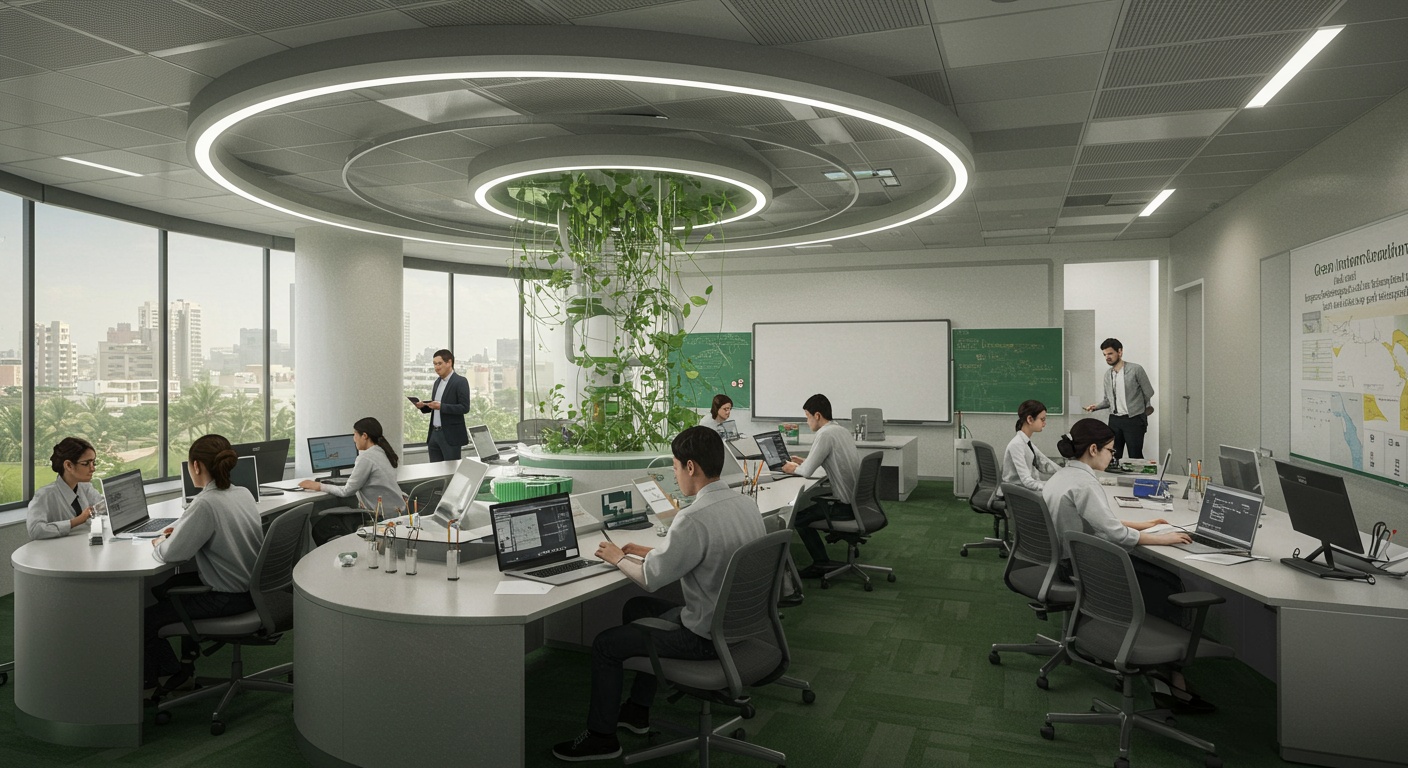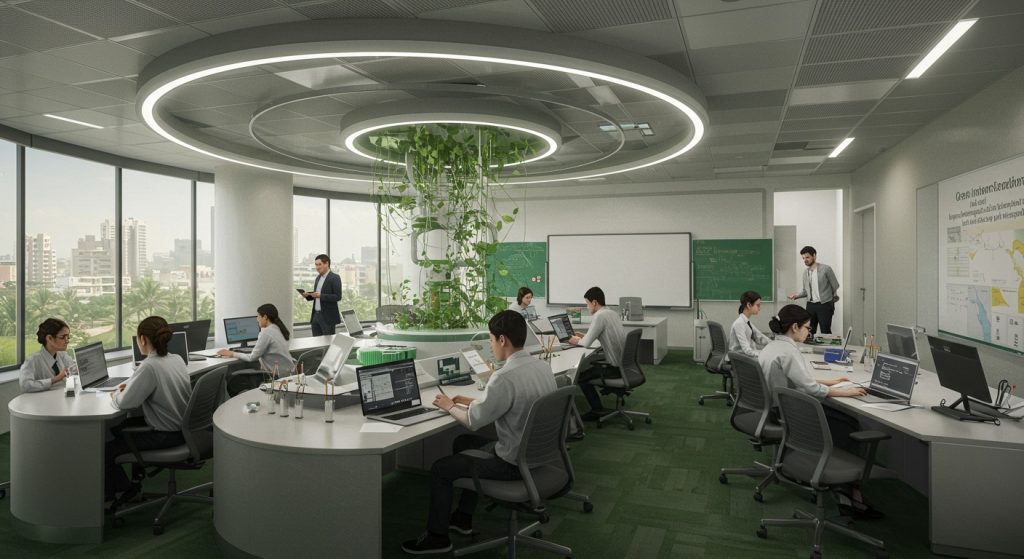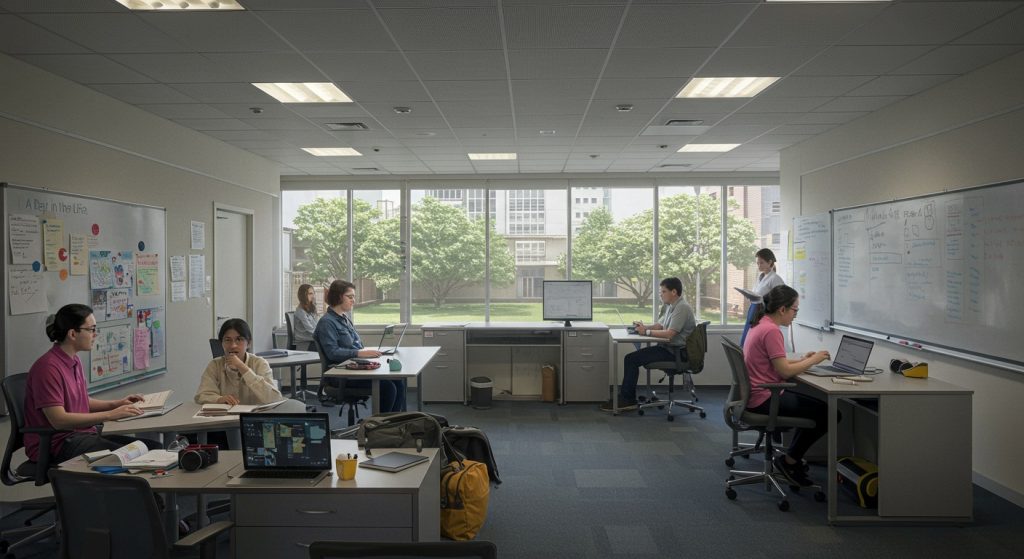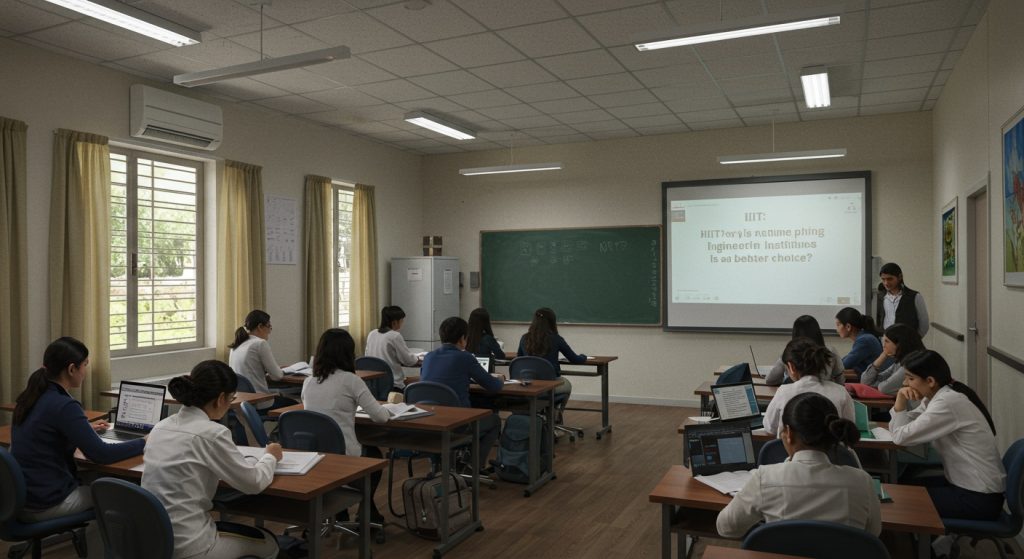As the urgency of global climate action intensifies, IIT Delhi emerges as a pivotal hub for sustainable engineering, spearheading green innovations that reshape our environmental future. Its pioneering research spans advanced renewable energy systems, including next-generation solar and bioenergy, alongside transformative waste management and circular economy solutions. Interdisciplinary teams actively develop novel approaches to carbon capture, green materials. Resilient smart grids, directly addressing India’s ambitious net-zero commitments. These cutting-edge initiatives not only advance engineering science but also translate into impactful, scalable technologies, positioning IIT Delhi at the vanguard of a sustainable tomorrow.

Understanding Green Innovations and Sustainable Engineering
In an era defined by environmental challenges, the concepts of ‘green innovation’ and ‘sustainable engineering’ have emerged as cornerstones for building a resilient future. But what exactly do these terms mean. Why are they so crucial?
- Green Innovation: This refers to the development of new products, processes, or services that aim to reduce environmental impact. It’s about finding creative solutions that not only meet our needs but also protect our planet’s resources. Think of it as a broad umbrella encompassing everything from renewable energy technologies to eco-friendly materials and waste reduction strategies. The goal is to achieve economic and social benefits while minimizing harm to the environment.
- Sustainable Engineering: This is the practical application of scientific and engineering principles to design, construct. Operate systems that are environmentally sound, economically viable. Socially equitable. It’s about ensuring that our engineering solutions consider the long-term well-being of both people and the planet. This means designing for efficiency, minimizing waste, using renewable resources. Planning for the entire lifecycle of a product or system – from raw material extraction to disposal or recycling.
The synergy between these two fields is vital. Green innovations provide the breakthroughs. Sustainable engineering ensures these breakthroughs are implemented responsibly and effectively. Institutions like IIT Delhi, recognized among the Top IITs for their research prowess, are at the forefront of this critical work, transforming abstract concepts into tangible solutions that address pressing global issues like climate change, resource depletion. Pollution.
IIT Delhi’s Vision for a Sustainable Future
IIT Delhi has long been a beacon of academic excellence and research innovation in India. Its commitment to addressing global challenges is particularly evident in its extensive portfolio of sustainable engineering research initiatives. The institute’s vision is rooted in fostering interdisciplinary collaboration, pushing the boundaries of scientific discovery. Translating cutting-edge research into real-world applications that benefit society and the environment.
Their approach is holistic, acknowledging that sustainability is not a single issue but a complex web of interconnected problems. This means their research spans various domains, from energy and water to materials and urban planning. By leveraging their vast intellectual capital and state-of-the-art facilities, IIT Delhi aims to:
- Develop next-generation clean technologies.
- Create sustainable solutions for resource management.
- Innovate policies and frameworks that promote environmental stewardship.
- Educate and train future leaders in sustainable engineering and green innovation.
This comprehensive strategy positions IIT Delhi as a leader among the Top IITs in driving India’s transition towards a greener, more sustainable future, contributing significantly to global efforts in environmental protection and resource conservation.
Key Research Areas and Initiatives
IIT Delhi’s sustainable engineering research initiatives are vast and diverse, tackling some of the most critical environmental challenges facing our world. Here, we delve into some of the key areas where their researchers are making significant strides.
Renewable Energy Technologies: Powering the Future Sustainably
The transition from fossil fuels to clean, renewable energy sources is paramount for mitigating climate change. IIT Delhi is a hub for innovation in this sector, focusing on enhancing efficiency, reducing costs. Developing novel approaches.
- Advanced Solar Photovoltaics (PV): Researchers are working on improving the efficiency and durability of solar cells, including perovskite solar cells and organic photovoltaics. These next-generation materials promise lower manufacturing costs and better performance in diverse conditions. For instance, some projects focus on flexible solar cells that can be integrated into buildings or even clothing.
- Biofuels and Bioenergy: Converting biomass (organic matter like agricultural waste, algae, or municipal solid waste) into usable energy forms is a key area. Scientists are developing efficient processes for producing biofuels (like bioethanol and biodiesel) and bio-hydrogen, offering sustainable alternatives to conventional fuels. A notable initiative involves developing biorefineries that can produce multiple products (fuels, chemicals, power) from a single biomass feedstock, maximizing resource utilization.
- Energy Storage Solutions: The intermittency of renewable sources like solar and wind necessitates robust energy storage. Research includes advanced battery technologies (e. G. , solid-state batteries, flow batteries) and supercapacitors, aiming for higher energy density, longer lifespans. Safer operation.
Waste Management and Resource Recovery: Transforming Waste into Wealth
The growing volume of waste is a global crisis. IIT Delhi’s initiatives focus on innovative ways to reduce, reuse. Recycle, turning waste from a problem into a valuable resource.
- Waste-to-Energy Technologies: This involves converting municipal solid waste, industrial waste. Agricultural residues into energy through processes like gasification, pyrolysis. Anaerobic digestion. For example, a project might explore how to efficiently convert plastic waste into fuel oil or synthesize biogas from organic waste for cooking or electricity generation.
- E-Waste Recycling: With the proliferation of electronic devices, e-waste is a major concern due to hazardous materials. Research here focuses on developing environmentally sound and economically viable methods for extracting valuable metals (gold, silver, copper) and safe disposal of toxic components. This includes hydrometallurgical and pyrometallurgical techniques that are less polluting.
- Circular Economy Models: Beyond just recycling, researchers are designing systems where products are designed for durability, repairability. Ultimate reuse or recycling, minimizing waste generation in the first place. This involves material flow analysis and life cycle assessments to identify opportunities for resource recovery.
Green Materials and Construction: Building Sustainably
The construction sector is a major consumer of resources and energy. IIT Delhi is pioneering the development of eco-friendly materials and construction practices.
- Sustainable Building Materials: This includes developing concrete alternatives using industrial by-products (like fly ash or blast furnace slag), geopolymers. Bio-composites. The goal is to reduce the carbon footprint associated with traditional building materials. For instance, research into ‘green concrete’ aims to replace a significant portion of cement with industrial waste, reducing CO2 emissions.
- Energy-Efficient Buildings: Research focuses on passive building design (optimizing natural light and ventilation), advanced insulation materials. Smart building management systems that minimize energy consumption for heating, cooling. Lighting. This includes thermal comfort studies and simulations for various climatic zones.
- Waste Utilization in Construction: Projects explore using construction and demolition waste as aggregates or binders in new construction, closing the loop on building materials.
Water Management and Purification: Ensuring Water Security
Access to clean water is a fundamental human right and a growing challenge. IIT Delhi’s research addresses water scarcity and quality issues through innovative technologies.
- Advanced Water Treatment Technologies: This involves developing novel membranes for desalination and wastewater treatment, using nanotechnology for pollutant removal (e. G. , heavy metals, pharmaceuticals). Advanced oxidation processes. A specific example could be the development of low-cost, gravity-fed filtration systems suitable for rural communities.
- Wastewater Treatment and Reuse: Focusing on treating domestic and industrial wastewater to a quality suitable for non-potable uses like irrigation, industrial processes, or even groundwater recharge. This includes biological treatment methods and phytoremediation (using plants to remove pollutants).
- Smart Water Management: Utilizing IoT (Internet of Things) sensors and data analytics for real-time monitoring of water quality, leakage detection in distribution networks. Optimizing water usage in agriculture and urban areas.
Sustainable Mobility: Greening Transportation
Transportation is a significant contributor to air pollution and greenhouse gas emissions. IIT Delhi researchers are exploring solutions for cleaner, more efficient mobility.
- Electric Vehicle (EV) Technologies: Research encompasses improving battery performance, developing efficient charging infrastructure. Optimizing EV powertrain designs. This includes work on Battery Management Systems (BMS) for longer battery life and safety.
- Alternative Fuels: Beyond biofuels, investigations into hydrogen fuel cells and other sustainable energy sources for vehicles are underway, aiming to reduce reliance on fossil fuels.
- Smart and Integrated Mobility Systems: Developing intelligent traffic management systems, public transport optimization models. Promoting shared mobility concepts to reduce congestion and emissions.
Impact and Real-World Applications
The true measure of research lies in its impact beyond the laboratory. IIT Delhi’s green innovations are designed to transition from prototypes to practical solutions, offering tangible benefits to industry, communities. The environment.
Case Studies and Pilot Projects
Many of the initiatives at IIT Delhi move beyond theoretical models to practical implementation:
- Decentralized Waste-to-Energy Units: Imagine a small community processing its organic waste locally to generate biogas for cooking fuel or electricity. IIT Delhi researchers have developed compact, efficient anaerobic digesters that can be deployed at a community level, reducing reliance on traditional energy sources and managing waste simultaneously. This offers a sustainable solution for both rural and urban fringe areas.
- Low-Cost Water Filters: In areas with contaminated water sources, access to clean drinking water is a major challenge. IIT Delhi has developed and piloted low-cost, robust water purification systems, often incorporating natural materials or simple filtration techniques, making safe drinking water accessible to underserved populations. These systems are designed for ease of maintenance and local scalability.
- Energy-Efficient Building Retrofits: Working with government agencies and private firms, IIT Delhi experts have advised on retrofitting existing buildings to significantly reduce their energy consumption. By implementing strategies like improved insulation, energy-efficient glazing. Smart lighting systems, these projects demonstrate how older infrastructure can be modernized for sustainability, leading to substantial energy savings and reduced operational costs. For instance, a government office building might see a 20-30% reduction in its electricity bill after implementing recommended changes based on IIT Delhi’s research.
Economic and Environmental Benefits
These innovations translate into significant advantages:
- Resource Conservation: By promoting recycling, reuse. Efficient resource utilization, these initiatives reduce the strain on virgin resources. For example, using industrial waste in concrete preserves sand and aggregates.
- Pollution Reduction: Cleaner energy technologies reduce air pollution, while advanced water treatment minimizes water contamination. Waste-to-energy projects divert waste from landfills, reducing methane emissions.
- Job Creation: The development and deployment of green technologies foster new industries and create skilled jobs in areas like renewable energy installation, waste management. Sustainable manufacturing.
- Cost Savings: Over the long term, energy efficiency, waste valorization. Water recycling can lead to significant operational cost savings for industries and households alike.
- Improved Public Health: Cleaner air and water directly contribute to better public health outcomes, reducing incidences of respiratory and waterborne diseases.
The work at IIT Delhi showcases how cutting-edge research can be directly applied to solve real-world problems, fostering a more sustainable and prosperous future for India and beyond. Their contributions highlight why IIT Delhi is consistently ranked among the Top IITs for its impactful research.
Collaborations and Future Outlook
The journey towards a sustainable future is a collaborative one. IIT Delhi recognizes this fundamental principle and actively engages in partnerships that amplify the impact of its research and accelerate the adoption of green innovations.
Strategic Partnerships and Outreach
IIT Delhi’s sustainable engineering initiatives benefit immensely from a network of collaborations:
- Industry Partnerships: Collaborations with private companies are crucial for translating laboratory breakthroughs into marketable products and services. These partnerships often involve joint research projects, technology licensing. Pilot deployments. For example, a company might partner with IIT Delhi to refine a new battery technology for electric vehicles or to scale up a waste-to-energy process.
- Government Agencies: Working closely with ministries and government bodies helps shape environmental policies, implement national sustainability goals. Deploy solutions on a larger scale. This often involves providing scientific expertise for policy formulation, conducting feasibility studies for large-scale projects (like smart cities or national renewable energy targets). Demonstrating technologies in public infrastructure.
- International Research Collaborations: Partnering with leading universities and research institutions worldwide brings diverse perspectives, shared resources. Access to global best practices. These collaborations often focus on grand challenges that require global solutions, such as climate modeling, transboundary water management, or developing universal standards for green technologies.
- Community Engagement: Beyond formal partnerships, IIT Delhi also engages directly with local communities, particularly for projects related to water purification, waste management. Decentralized energy solutions. This ensures that the solutions developed are practical, acceptable. Truly meet the needs of the end-users.
The Path Forward: Scaling Impact and Addressing New Challenges
Looking ahead, IIT Delhi is committed to expanding its research frontiers and deepening its impact in sustainable engineering. The future outlook includes:
- Focus on Emerging Technologies: Exploring the potential of artificial intelligence (AI) and machine learning (ML) for optimizing energy grids, predicting environmental changes. Improving resource management efficiency. This could involve AI-driven systems for predictive maintenance of solar farms or ML models for optimizing waste segregation.
- Interdisciplinary Research Hubs: Further strengthening interdisciplinary research centers that bring together experts from engineering, science, social sciences. Humanities to tackle complex sustainability challenges holistically. For instance, a hub might focus on the nexus of food, energy. Water security.
- Policy Influence and Advocacy: Continuing to provide robust, evidence-based research that can inform and influence environmental policies at national and international levels, advocating for sustainable practices and green transitions.
- Talent Development: Investing in training the next generation of sustainable engineers and innovators through specialized academic programs, research opportunities. Entrepreneurial support, ensuring a continuous pipeline of expertise for the green economy.
By fostering a culture of innovation, collaboration. Societal responsibility, IIT Delhi continues to solidify its position among the Top IITs, playing a pivotal role in shaping a sustainable future for India and contributing significantly to global efforts in environmental stewardship and green development. The ongoing research initiatives promise not just technological advancements. Also a blueprint for a more resilient and harmonious relationship between humanity and the planet.
Conclusion
IIT Delhi’s pioneering efforts in sustainable engineering, from advanced materials for carbon capture to innovative water purification systems, truly redefine our approach to global environmental challenges. These initiatives underscore a critical shift towards practical, scalable solutions, moving beyond theoretical concepts. My personal observation suggests that the real impact accelerates when interdisciplinary teams, like those at IIT Delhi, converge, blending engineering prowess with policy and economics. To build on this momentum, I urge aspiring engineers and policymakers alike to actively engage with these emerging green technologies. Seek opportunities for collaboration, champion research that bridges academia and industry. Always consider the lifecycle impact of your innovations. The future demands not just technological breakthroughs. A commitment to integrating them into a resilient, eco-conscious society. Let us collectively foster an era where engineering is synonymous with environmental stewardship, shaping a truly sustainable tomorrow.
More Articles
Top Engineering Universities in France: A Comprehensive Guide for 2025
Best UK Universities For Artificial Intelligence Research In 2025
International Students: Application Checklist for Top UK Universities
Funding Your Postgraduate Studies in the UK: A Comprehensive Guide
FAQs
What exactly is ‘Green Innovations’ at IIT Delhi?
It’s IIT Delhi’s dedicated umbrella for cutting-edge sustainable engineering research. We’re focused on developing eco-friendly solutions and technologies across various engineering disciplines to address pressing environmental challenges and promote a greener future.
What kind of research areas do you cover under these initiatives?
Our research is quite broad! We delve into areas like renewable energy technologies, advanced waste management and recycling, sustainable water solutions, green building materials, eco-friendly manufacturing processes. Even sustainable transportation. The goal is always to minimize environmental impact and maximize resource efficiency.
Are students involved in this sustainable research?
Absolutely! Students are at the core of our ‘Green Innovations’ efforts. From undergraduates to PhD candidates, they actively participate in research projects, laboratory work. Field studies, gaining invaluable hands-on experience and contributing significantly to new discoveries.
How do these innovations actually help the environment?
Our innovations aim to tackle environmental issues head-on. This includes reducing pollution, conserving natural resources, decreasing greenhouse gas emissions, finding efficient ways to manage waste. Developing cleaner energy alternatives. Ultimately, it’s about creating practical solutions for a more sustainable planet.
Is IIT Delhi collaborating with anyone on these projects?
Yes, collaboration is key! We frequently partner with industry leaders, government agencies, other academic institutions. International organizations. These partnerships help us amplify our research, share knowledge. Bring our innovations from the lab into real-world application.
What makes IIT Delhi a leader in green engineering research?
IIT Delhi leverages its strong foundation in engineering excellence, state-of-the-art facilities. A wealth of brilliant minds dedicated to sustainability. Our multidisciplinary approach, combined with a focus on impactful, scalable solutions, positions us at the forefront of green innovation.
Can businesses or other organizations benefit from this research?
Definitely! Many of our research outcomes have direct applications for businesses and organizations seeking to improve their environmental footprint, reduce operational costs through efficiency, or adopt new sustainable technologies. We aim for our innovations to have real-world impact beyond academia.



